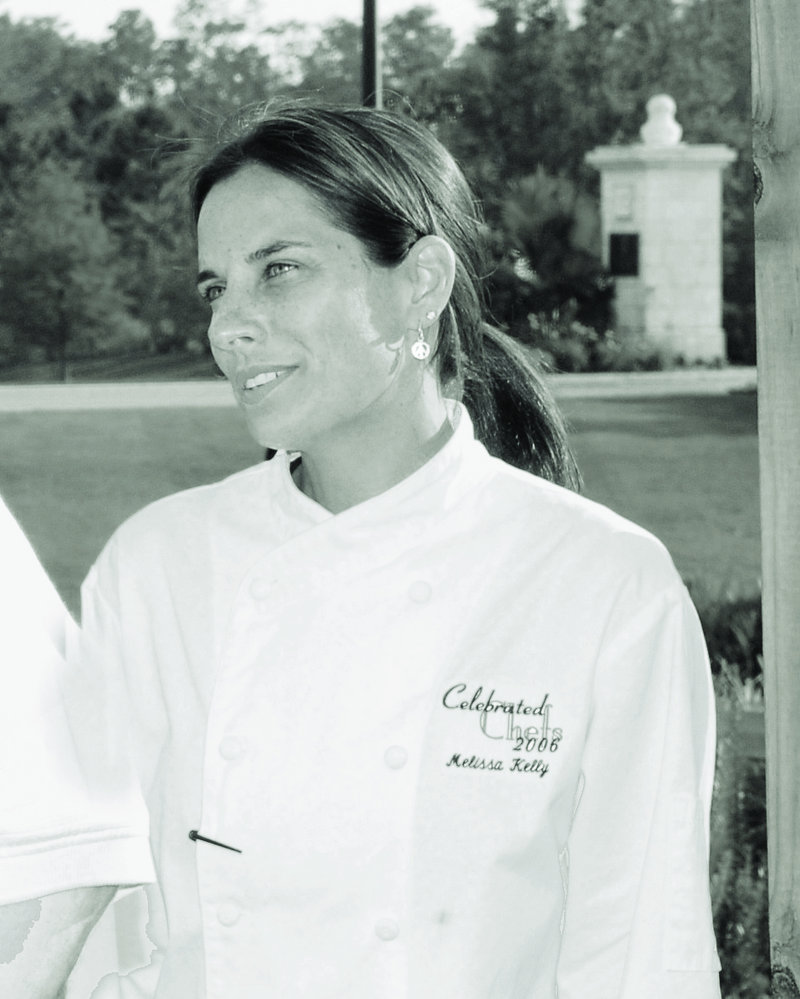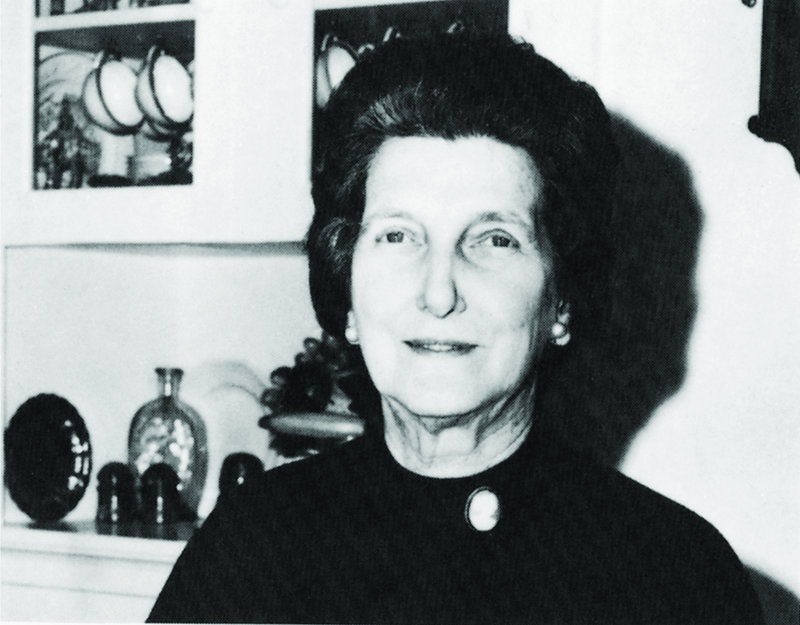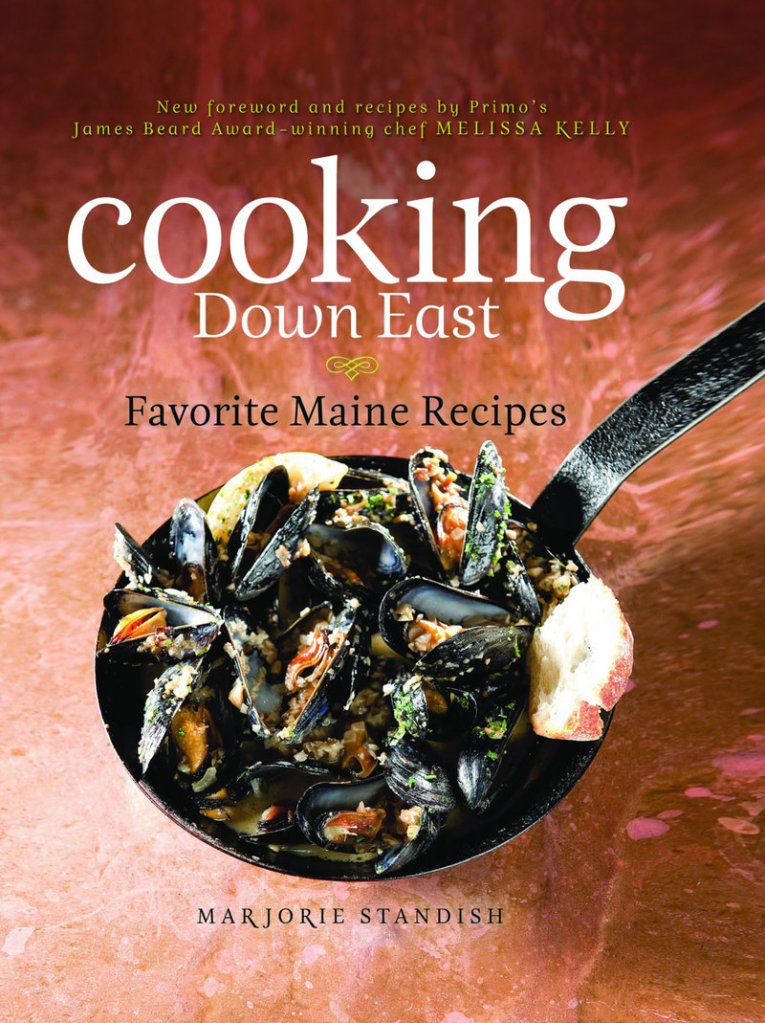For 25 years, Marjorie Standish wrote a food column for this newspaper called “Cooking Down East.”
Three hundred and fifty of her classic Maine recipes were compiled in book form in 1969, and “Cooking Down East” soon became the state’s best-selling cookbook. Over the years, Standish’s fans — and they are legion — have bought more than 100,000 copies.
Standish, who died in 1998 at age 90, taught a generation of cooks the value of using local ingredients and of keeping things simple. She knew the importance of keeping heritage recipes alive, and wrote eloquently about food’s role in our memory and culture. In the foreword to her book, she evokes the sounds “of your mother chopping red flannel hash in a heavy black spider; the clank of the metal spoon as she cleaned out the last of the frosting; the rattle as the lid was removed from a jar of pickles just brought from the cellar.”
But Standish was also a product of her times. In addition to classic seafood stews and chowders made with simple ingredients, she included recipes that used popular convenience products such as Cheez Whiz, bottled steak sauce and the seasoning Accent.
Now Standish’s cookbook has been reissued, but with a delicious twist. Chef Melissa Kelly of the Rockland restaurant Primo, a James Beard award winner who also runs restaurants in Orlando and Tucson, has joined Standish in her kitchen.
It’s one of two reissues of cookbooks from Down East this year. The other is “Good Maine Food” by Marjorie Mosser, which has been updated by food historian Sandra Oliver.
The new “Cooking Down East” (Down East, $27.95) includes more than a dozen recipes from Kelly, as well as her tips for updating Standish’s recipes. Standish’s recipe for Crispy Oven Chicken, for example, calls for a stick of margarine and three cups of Rice Krispies. In a margin note, Kelly suggests using panko bread crumbs and butter instead.
Standish offers her mother’s recipe for cream of tartar biscuits; right next to it, Kelly has published the recipe for James Beard’s Cream Biscuits. And next to Standish’s Porcupine Meatballs is Kelly’s Pork Saltimbocca, which she says is “probably the most popular dish at Primo.”
The Maine Sunday Telegram recently spoke with Kelly about what it was like to “work” with the renowned Maine food writer.
Q: You lead an awfully busy life with three restaurants and your farm at Primo to run. How did you find the time to work on this cookbook?
A: You know, there’s always time to do something that you enjoy. I do have a very crazy schedule. Kathleen Fleury, who’s the girl I worked with at Down East publications, really facilitated it with me, and she was great. She got me before my crazy season really kicked in here.
I knew the book. I always like to have one foot in the past and one foot in the future with food, so it was the perfect project for me to delve into and have some fun with. Instead of writing a book from scratch, revising a book is totally do-able.
Q: Had you cooked from this book before? Had you read it?
A: I haven’t cooked from it before, but usually I don’t cook from cookbooks. I just kind of peruse them and then take snippets of ideas or classic recipes and try and update them, which is what we basically did with the book.
Q: Do you feel like you learned a lot about Marjorie Standish while you were working on this project?
A: You know, it’s a generational thing. I learned a lot about that time. In the forward, I said that just when Marjorie was putting this book out, it was such a different day with food in this country and for women in this country. It’s interesting for me to see the transformation from then till now. She talks about a lot of convenience products, canned products, margarine, and just different things that I would never use today.
And it’s funny, because I feel like it’s probably not how she grew up. Her mom and grandmother probably cooked everything from scratch, but in her generation, all of these things were new and exciting and trendy, and so that’s what she did. And then in my generation, we’re trying to go back to the basics and the roots.
It’s just interesting to see how it’s a generational thing. A lot of her recipes are really old-fashioned, classic Maine-New England recipes, and then in some of them she’s telling you, “Well, you’re going to be a working mom or you’re on the go, so use this. This is a good way to do this faster.” And I’m taking it back to the other side: You can still do it fast, but let’s do it a little healthier.
Q: Did you find things that you two had in common?
A: Oh, absolutely. She loved food, and the same as me, she loved tying food and people together. And she talks about experiences of time and place, celebrating with friends and family, and how food plays such an important role in traditional things. All of that we have in common.
Q: As you mentioned, some of the recipes are definitely Maine classics, like a lot of the seafood stews and chowders. They’re very simple, and kind of retro in a good way. But there are some others that modern cooks would definitely find puzzling. Were there any that struck you as strange? I’m thinking of the things like cooking chicken with Rice Krispies.
A: The cereal crusts were interesting, although, you know what? Honestly, a very famous chef in New York, one time I worked in his kitchen and he crusted a fish with cream of wheat. That’s more of a grain than a processed cereal, but it’s getting creative too, with what you have.
Q: Were there some recipes that were such classics — I’m thinking about heritage dishes such as the salt cod dinner — that you just didn’t want to tinker with them?
A: You know, some of her recipes, I just really like the simplicity of it. Most of them were the seafood recipes, like you said, the stews and the chowders and the salt cod dinners and all of that. You can’t really mess with her quahog stew, you know? It’s just perfect. You make that, and it’s just the way it should be. There’s not too much to do.
Q: Can you talk a little about the process of working on the book? Many of your margin notes suggested making a few simple substitutions, such as using tomato paste instead of ketchup. Were you trying to find a balance between keeping Marjorie’s simple recipes simple and updating them without making them too complicated?
A: Yeah, they’re her recipes. They’re definitely not my recipes. I did add a few recipes to the book, but I was just trying, like I said, to bring them into the next phase of how you could take a good idea and maybe make it a little healthier or make it a little tastier, a little more intense or something, but not change her recipe.
I didn’t really want to change her recipes. I was trying to keep her fresh style and her philosophy because I think that was good, but bring it into today.
Q: Do you have plans to write a cookbook someday?
A: I have a book out which I did a couple of years ago, and it has recipes in it. It’s called “Mediterranean Women Stay Slim, Too,” and it’s kind of a retort to “French Women Don’t Get Fat.” It’s more about the lifestyle of food and eating and traditions, and how for me food is just such an important part of our life, and all of my memories are connected with food. I think a lot of people, when they have a bite of something, that transports them back to their childhood, to a special moment that they had, a celebration. Or even some are bittersweet memories too. But I think food can just take you and transport you back to that place. And so my book is more about talking about that.
But I am going to work on a cookbook. I have an idea, I just don’t have the time right now. We do have a small farm. We have chickens and pigs and bees, compost. We’re a very sustainable little operation. I know a lot of people are starting to pay more attention to eating that way and living that way and supporting people who grow things that way. My kitchen’s a very full-circle kitchen. I make everything from scratch. So I definitely think there’s a book in there somewhere.
Q: So it’s not necessarily a Primo cookbook but something based on that philosophy?
A: It would be the whole gamut of what we do, and why do we do it too. Because for me as a chef, there’s a lot of value-added things you get when you appreciate your product like that, when you can take the first little sprout out of the garden, green garlic, and then you can use the garlic and then you can use the garlic scapes. Or when we extract our honey, I learn something every time. Sometimes there’s a lot of pollen in it and sometimes it’s really dark and caramelly and sometimes it’s really light. It’s where the bees were, and what they’re bringing into the hive. And as a chef, I’ll adapt to what the food tells me to do.
Q: You know, I think Marjorie Standish probably would have loved to spend a day with you.
A: I think together we would have a lot of fun. She sounded like a really fun lady too. She was way ahead of her time.
Staff Writer Meredith Goad can be contacted at 791-6332 or at:
mgoad@pressherald.com
Send questions/comments to the editors.






Success. Please wait for the page to reload. If the page does not reload within 5 seconds, please refresh the page.
Enter your email and password to access comments.
Hi, to comment on stories you must . This profile is in addition to your subscription and website login.
Already have a commenting profile? .
Invalid username/password.
Please check your email to confirm and complete your registration.
Only subscribers are eligible to post comments. Please subscribe or login first for digital access. Here’s why.
Use the form below to reset your password. When you've submitted your account email, we will send an email with a reset code.